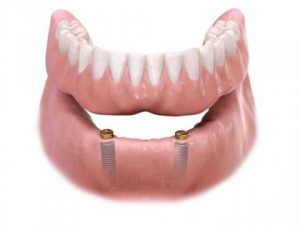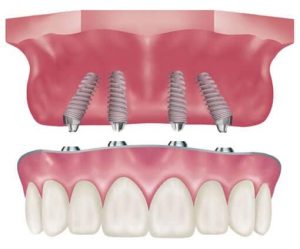Implant supported dentures typically cost between $6,000 to $15,000 per arch for removable options, while fixed implant supported dentures range from $15,000 to $30,000+ per arch. The average costs for different types of dentures can vary widely, with full, partial, flexible, snap-on, and immediate dentures each having their own typical price ranges.
Dentures cost can depend on several factors, including the type of denture, materials used, location, and the complexity of the procedure. Implant supported dentures cost, in particular, can be influenced by the number of implants, the quality of materials, and additional preparatory procedures, leading to significant variation in pricing.
Understanding Implant Supported Dentures
Implant supported dentures represent a significant advancement over traditional dentures. Unlike conventional dentures that rely on suction and adhesives, these prosthetics anchor directly to dental implants surgically placed in your jawbone. This provides superior stability, improved quality of life, and better preservation of your jawbone structure.
Two main types are available:
- Snap-in dentures (removable): Attach to implant posts but can be removed for cleaning
- Permanent dentures (fixed): Permanently secured and function like natural teeth
In addition, custom dentures are available, offering a tailored fit and higher quality compared to standard options due to their personalized fabrication process.
Cost Breakdown by Treatment Type
Removable Implant Supported Dentures
- Average cost range: $6,000 – $15,000 per arch
- Implants required: 2-6 per arch
- Best for: Patients seeking improved stability over traditional dentures
A partial denture may be considered for patients who do not require a full arch replacement, and can serve as a temporary or alternative solution to implant-supported restorations.
Fixed Implant Supported Dentures (All-on-4/6)
- Average cost range: $15,000 – $30,000+ per arch
- Implants required: 4-6 per arch
- Best for: Patients wanting the closest experience to natural teeth with Full Arch dental implants
Traditional Dentures (Comparison)
- Cost range: $600 – $3,000 per arch
Lower end dentures are typically found at the lower end of this price range, but they often have reduced quality, durability, and comfort compared to higher-end dentures.
- No surgical procedures required
- Limited chewing efficiency (15-20% of natural teeth)
Factors That Affect Overall Cost
Number of Implants Required
The configuration varies based on your specific needs. Mini implants may be an option for some patients, potentially reducing costs while still providing improved stability over traditional dentures.
Geographic Location
Costs involved can vary based on your location. Urban areas and regions with higher living costs typically have higher dental fees.
Preparatory Procedures Required
Many patients require bone grafts or other preparatory procedures before implant placement. Bone grafting procedures can add $300-$3,000 per site to your treatment cost.
Experience Level of Your Dentist
Experienced dentists who specialize in implant procedures may charge premium rates, but reputable dentists cost more due to their advanced qualifications and higher success rates. Choosing an experienced dentist often leads to better outcomes and fewer complications.
Implant Posts and Components
Implant posts are the foundation of any successful implant supported denture, acting as the secure anchors that hold your dentures firmly in place within the mouth. When considering implant supported dentures, patients typically choose between traditional dental implants and mini dental implants. Traditional dental implants are known for their durability and strength, with costs generally ranging from $1,600 to $3,200 per implant. Mini dental implants, which are smaller and require less invasive placement, can be a more affordable option, costing between $500 and $1,500 each.
The quality of the implant posts and other components used in your treatment plays a significant role in the overall cost and long-term success of your implant supported denture. High-quality implant posts, crafted from durable materials, provide superior stability and reduce the likelihood of future repairs or replacements. In contrast, opting for lower-end components may lead to increased wear and tear, potentially resulting in additional costs over time.
For some patients, especially those with reduced bone density in the upper or lower jaw, bone grafts may be necessary before receiving traditional dental implants. These preparatory bone grafting procedures can add to the final price but are essential for ensuring the stability and longevity of the implants.
Ultimately, working with experienced dentists is crucial to selecting the right implant posts and components for your unique needs. Their expertise ensures that your implant supported dentures are both cost-effective and built to last, providing you with a stable, comfortable, and natural-looking smile.
Insurance and Financing Options
Dental Insurance Coverage
Most dental insurance companies provide limited coverage for implant supported dentures, typically covering only the denture portion. It is important to check with your insurance provider to understand the specific coverage details for implant supported dentures. Traditional dental implants are often considered cosmetic by insurance providers, though this is gradually changing.
Third Party Financing Options
Many dental practices offer financing plans to help patients manage the costs involved. Options include:
- In-house payment plans
- Healthcare credit cards
- Personal loans
- Dental-specific financing companies
Patients can pay for dentures using these methods, allowing for flexible payment solutions tailored to their financial situation.
When using a healthcare credit card, the owner is responsible for selecting participating providers and managing payments to ensure all expenses are covered appropriately.
Treatment Timeline and Process
The complete process typically takes 4-12 months:
- Initial consultation and planning
- Implant placement surgery
- Healing period (3-6 months for osseointegration)
- Custom denture fabrication
- Final attachment and adjustments
Patients must complete these steps to successfully receive dental implants.
Maintenance and Care
Maintaining your implant supported dentures is key to protecting your investment and enjoying a perfect smile for years to come. Regular visits to reputable dentists for professional cleanings and check-ups help ensure that your implant supported denture remains stable, comfortable, and free from complications. Practicing good oral hygiene at home—such as brushing, flossing, and caring for your gums and any remaining natural teeth—also plays a vital role in preserving both your oral health and the longevity of your dentures.
To further protect your implant supported dentures, it’s wise to avoid habits that can cause damage, like chewing on hard or sticky foods. These simple steps can help prevent unnecessary repairs or replacements, keeping your overall costs down in the long run.
The cost of ongoing maintenance and care is generally a small fraction of the total investment in implant supported dentures, but it is essential for maximizing the benefits and quality of life that come with this treatment. Many dental insurance companies offer some coverage for routine maintenance, which can help reduce out-of-pocket expenses. Be sure to review your insurance benefits and discuss available financing options with experienced dentists to make your ongoing care as affordable as possible.
By prioritizing proper maintenance and working closely with reputable dentists, patients can enjoy the full benefits of their implant supported dentures—improved confidence, comfort, and a lasting, beautiful smile.
Benefits Over Traditional Dentures
Implant supported dentures offer significant advantages:
- Improved chewing efficiency: 60-90% of natural teeth function
- Better stability: No slipping or sliding
- Bone preservation: Implants stimulate jawbone, preventing bone loss
- Enhanced quality of life: Increased confidence and comfort
- Longevity: Implant posts can last a lifetime with proper care
Finding the Right Treatment
Choosing Experienced Dentists
Look for reputable dentists with specific training in implant procedures. Board certification and extensive experience with implant supported dentures are important qualifications.
Getting Accurate Cost Estimates
Schedule consultations with multiple providers to compare costs and treatment plans. Ensure estimates include all preparatory procedures and follow-up care.
Questions to Ask
- How many implants do you recommend for my case?
- What preparatory procedures will I need?
- What type of denture attachment system do you use?
- What is included in your quoted price?
- What financing options do you offer?
Long-Term Value Consideration
While the initial investment is substantial, implant supported dentures often provide better long-term value than traditional dentures. The improved stability, reduced need for adjustments, and better oral health outcomes can offset the higher upfront costs over time.
The denture portion typically lasts 15-20 years before replacement, while properly maintained implant posts can last a lifetime. This durability, combined with the significant improvement in quality of life, makes implant supported dentures a worthwhile investment for many patients.
When evaluating snap-in denture implants, it’s important to consider other factors such as personal preferences, oral health conditions, and overall suitability in addition to cost and benefits.
Consider scheduling a consultation with experienced dentists in your area to discuss your specific needs and get personalized cost estimates for your situation.


